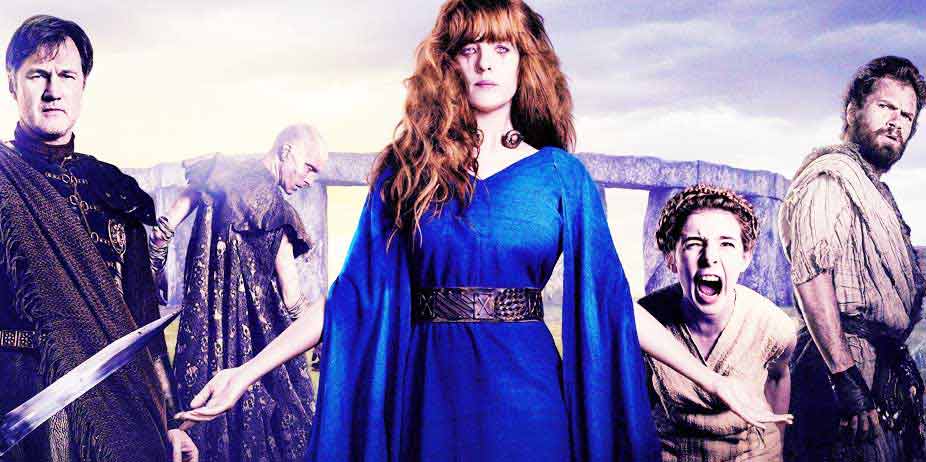
Britannia, Season 1 (2017)
Stories set in Europe's deep past have come into fashion since the success of The Last Kingdom, but Britannia is more historical fantasy than straight up drama, an unabashed world of supernatural entities where druids have mystical powers to enchant and blind their enemies, and turn to this magic when the brutal Roman Ninth Legion arrives.
Aulus (David Morrissey) has one main objective: to civilize the region and collect taxes for Rome. They do not much care about the war between Celtic tribes, and have no interest in interfering with the druids, but will side with whomever agrees to their terms. They arrive in the midst of a brutal conflict between Queen Antedia (Zoe Wanamaker) and King Pellenor (Ian McDiarmid). When their negotiated peace takes a violent turn, Pellenor becomes frustrated with his daughter, Kerra (Kelly Reilly). Born of a Roman and burdened by her mother's sacrificial death, Kerra believes in a future free of the brutal influences of Veran (Mackenzie Crook), leader of the druids.
Believed to be ancient and one of the 'first men,' Veran's influence over her father grows even as he supports the promotion of an old prophecy, which may come to pass in feisty young Cait (Eleanor Worthington-Cox), when she joins up with an ex-druid Lindon (Stanley Weber), to rescue her father from Roman clutches... but Lindon has uncertain loyalties and wants answers to his questions. Meanwhile, Kerra faces suspicions of Roman conspiracy from her wrathful, power-hungry sister-in-law, Ania (Liana Cornell), whose tempestuous marriage to Phelan (Julian Rhind-Tutt) is unraveling.
On paper, it's a compelling and complicated plot, but on screen a lot of subplots cut into the action and the motives behind a lot of the characters' choices are obscured; the show seems to operate on the belief that all the characters believe in fate / the gods / prophecy and so they don't have to have rationalizations for anyone's increasingly erratic behaviors. It made no sense to me that a Roman general would take a psychedelic druid trip to the underworld and come back sold on the idea of prophecies; I did not really grasp why Phelan runs off with the person he does (is he desperate for answers or a more significant, meaningful life?), or how he feels about his sister; much as I love Kerra, why is she so forgiving of her father? And what does the subplot about the two Roman soldiers have to do with anything?
It took me a couple of episodes to get into it, but then the momentum picked up and the dynamics became interesting; it is a little lean on explaining things (like... why does the king's son's wife have a second husband??) but the characters are memorable. The two absolute scene-stealers are Eleanor Worthington-Cox as a courageous girl desperate to reclaim her father, and a virtually unrecognizable Mackenzie Crook, whose druid lord is so fantastically creepy, I never knew whether to look harder at him, or back away slowly. It's a nuanced, dark, menacing performance beyond the depth of the series' at times ludicrous subject matter.
Strangely, though, the entire thing works; the magic, the surreal visions, the trippy way they film the druids, the costumes, it's just that the script is a bit off and terribly archaistic -- it ranges from spectacular one-liners and truly surprising dark humor (at one point, a Roman soldier on the ancient world's equivalent of weed has an intense philosophical thought about gods, only to forget five seconds later what he even said) to modern dialogue and cringe-worthy sentences.
What I did like about it was the feminist tone throughout; these are strong, powerful women who stand on their own two feet, who make all their own decisions, and who do not fear death -- and I appreciate it very much that not a single one of them was raped to create controversy. I'm sick of it, and that alone rose Britannia a few notches in my estimation, even if the script is nuts.
Sexual Content:
Six sex scenes (some clothed, others have upper nudity)
scattered across nine episodes, including scenes in an
'orgy tent' (background) and implications of oral sex
(some scenes cut away); a woman taunts her husband's
inability to 'get it up'; a whore shows off her breasts
in the finale; backside nudity as a man cools his
injured backside in a river.
Language:
Lots of f-words, s-words, one c*nt, general insults and
references to private parts.
Violence:
Infrequent but gory; men and women are mowed down with
arrows, set on fire, stabbed with swords, beheaded, and
tortured for information (one scene includes a man being
flayed alive); close-ups of gaping wounds, flesh being
peeled from bones, etc (in one scene, druids slit a
man's throat, then cut into his flesh, remove his bones
from his skin, pack the skin with greens, and leave it
for the birds to eat); a woman has her heart graphically
cut out and burned; a man has the same done to him;
Romans send fire into a camp, burning people alive; a
man is skewered on a spear.
Other:
Scenes of men urinating and/or crouched to 'take a
dump'; tons of supernatural elements, druid witchcraft
and magic (casting spells, visions, prophecies,
sacrifices, etc).
